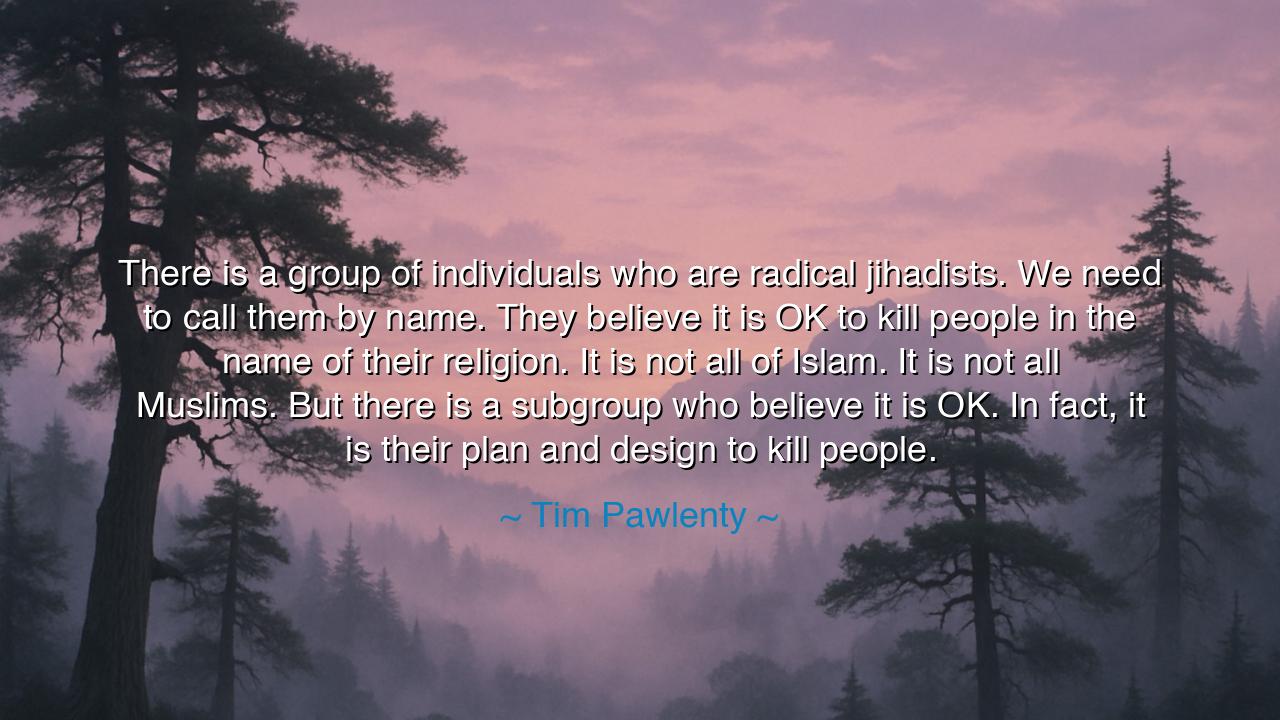
There is a group of individuals who are radical jihadists. We
There is a group of individuals who are radical jihadists. We need to call them by name. They believe it is OK to kill people in the name of their religion. It is not all of Islam. It is not all Muslims. But there is a subgroup who believe it is OK. In fact, it is their plan and design to kill people.






“There is a group of individuals who are radical jihadists. We need to call them by name. They believe it is OK to kill people in the name of their religion. It is not all of Islam. It is not all Muslims. But there is a subgroup who believe it is OK. In fact, it is their plan and design to kill people,” spoke Tim Pawlenty, in words both courageous and sorrowful, spoken at a time when fear clouded understanding and anger blurred justice. His message was not a cry for vengeance, but a plea for clarity, for the power of truth to pierce confusion. He sought to remind his people—and perhaps all peoples—that the strength of civilization lies not only in its armies, but in its discernment: the ability to name evil without condemning the innocent, to fight wickedness without losing one’s own humanity.
For Pawlenty’s words were born from the age of terror, an era when the world, shaken by the violence of extremism, struggled to find moral footing. Too often, in their fear, nations confused faith with fanaticism, and entire communities bore the weight of suspicion. Pawlenty’s wisdom was to draw a line between the many who seek peace and the few who worship death. He reminds us that evil often hides behind holy words, that even the noblest teachings can be twisted by those who crave domination. His call to “name them” is not merely political—it is moral precision, the act of distinguishing between darkness and light in a world where both dwell in human hearts.
Throughout history, this challenge has repeated itself. Consider the age of the Crusades, when men bearing crosses marched to kill in the name of Christ. Though their banners proclaimed righteousness, many were driven not by faith but by pride and conquest. The world, then as now, mistook zeal for virtue. Yet even in that time, voices of wisdom arose—like Saint Francis of Assisi, who journeyed unarmed into the camp of the Muslim Sultan al-Kamil during war, not to fight, but to speak of peace. Their meeting, a miracle of understanding amid chaos, proved that the path of the righteous lies not in generalization, but in courage—the courage to face one’s supposed enemies as fellow souls, not monsters. Pawlenty’s message echoes that same spirit: the call to confront evil directly, but with fairness, and without hatred.
His insistence on naming the radical jihadists reflects an ancient truth: that evil thrives when it is unnamed. To name something is to strip it of disguise, to drag it into the light. The ancients knew this well. In the old myths, heroes conquered monsters not merely with weapons, but by speaking their true names, for names hold power. By defining the enemy precisely—those who twist faith into a weapon—we deny them the ability to hide among the innocent. We separate disease from the body, corruption from the sacred, hatred from holiness. For as long as we fail to distinguish, we risk striking blindly and becoming the very thing we despise.
But Pawlenty also warns us of another danger: that in naming evil, we must not condemn the whole. “It is not all of Islam. It is not all Muslims,” he says, reminding us that the poison of extremism is not the essence of the faith it corrupts. The majority of Muslims, like the majority of humankind, seek peace, family, and meaning. To condemn them would be to commit collective injustice, a sin equal to the one we oppose. Here lies the eternal wisdom of balance—to hold justice and compassion in both hands, to oppose the guilty without wounding the innocent.
Consider the lesson of World War II, when many resisted fascism not by hating a people, but by opposing a destructive ideology. The greatest leaders of that age—Churchill, Roosevelt, De Gaulle—understood that evil resides not in nationality or race, but in ideas and choices. So too, Pawlenty calls upon the world to wage war not upon a religion, but upon a corruption of belief, a distortion that makes murder a sacrament. The true war, he implies, is a war of spirit and principle, to defend the sanctity of faith itself from those who profane it.
Thus, his words become more than a commentary—they become a teaching for all generations: name evil clearly, confront it courageously, and guard your heart from hatred as you do so. For evil does not vanish when it is denied, nor does truth survive when it is used as a weapon of prejudice. Let every person, every nation, and every faith remember that to fight darkness, one must not become dark. Seek justice, but with wisdom; seek safety, but with compassion.
In the end, Pawlenty’s quote is not about Islam or politics—it is about truth, courage, and moral clarity. It calls upon the leaders and people of every age to rise above confusion, to see both the danger of extremism and the worth of humanity. And so, let us heed his wisdom: to name what is evil, to defend what is good, and to walk the narrow path between fear and fairness. For only then will our struggle be not merely for survival, but for the preservation of the human soul itself.






AAdministratorAdministrator
Welcome, honored guests. Please leave a comment, we will respond soon